
台大化工所 | Podcast 一百種檸檬味 喜歡閱讀、學習新事物。 粉專內容 : 閱讀心得/ 區塊鏈知識/ 解決問題 我的平台:https://linktr.ee/Lemonway_Learning Telegram推薦文章、書籍:https://t.me/lemonwaylearning
Atomic Habits Reading Notes - By Lemonway
I recently spent a week reading Atomic Habits. In fact, the content is very simple, and there are a lot of chicken soup for the soul.
I think the point is [Can you really execute it accurately after reading it? ] . If I didn't make a change plan right away after reading this book and start changing my habits, I would feel a pity, it's really chicken soup for the soul.
So I plan to talk about two major points in the next notes.
1. The beliefs that atomic habits are to cultivate.
2. Four steps of atomic habit + develop small steps.
In the first place, I can make myself more proficient in atomic habits, and I hope it can help everyone to implement their own habits with more focus!
After reading the book, I did implement a lot of habit changes, such as #establishmymorningritual , #projectdevelopment within half a year , and indeed began to have small changes. I also set up my own fan special to record the daily reading progress! So I think atomic habits really affect me a lot!
1. Beliefs and steps to be cultivated by atomic habits
(1) It is good to improve by 1% every day
The core idea of Atomic Habit is that through small changes and progress every day, when viewed over time, it is a very big leap forward.
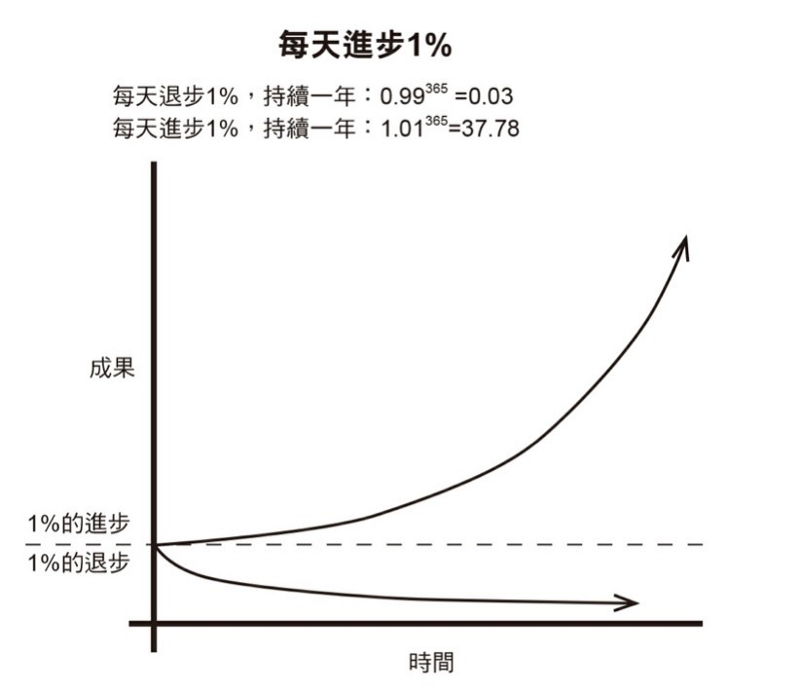
Although we are not necessarily easy to see huge changes in the short term, it will not change if we do not do it. I think beliefs are important. When I believe in something, I work very hard to get it done. Achieving goals has always been a matter of time. Really have to believe in yourself.
I think especially in this era of rapid changes in the world, when we no longer update ourselves and keep learning, in fact, the progress of the world means that we are regressing until we are eliminated by the world!
(2) Progress is not linear. Focus on the process not the result
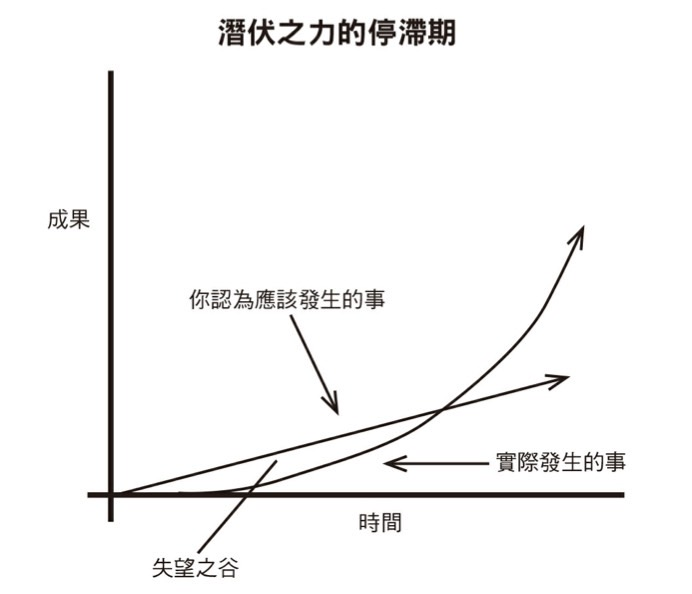
Everyone should have the experience of trying for a long time but not succeeding. But sometimes the number of samples in time is simply not enough for us to see the change before we give up.
The book mentioned a good idea: after setting a goal, forget about the goal! Focus on how to make the system perform better! Continue to strengthen the system! Focus on whether there is a better process today than yesterday.
(3) Don't work hard with "results" as the guide! It is more important to let yourself have an identity!
Behaviour that is inconsistent with identity cannot last. So stop relying on willpower to build habits! Make a habit part of your identity, and it will last forever.
Example: Two people who refuse cigarettes.
The first said, no thanks, I'm quitting smoking. On behalf of his identity, he is still a smoker, but he is now using willpower to quit smoking.
The second said, no thanks, I don't smoke. His identity, smoking is a thing of the past. He is not smoking.
Which of these two beliefs is more likely to quit smoking? Identity is the ultimate goal!
2. Four Steps of Atomic Habits + Develop Small Steps
The Habit Loop: Create a new habit and think in four steps!
1. (hint) make the habit obvious> 2. (desire) make the habit attractive> 3. (response) make the habit easy> 4. (desire) make the reward satisfying
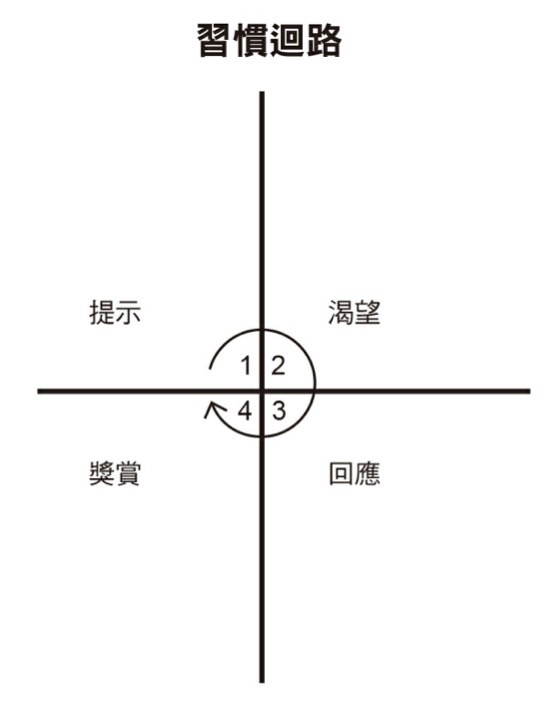
(1) Make the prompt obvious:
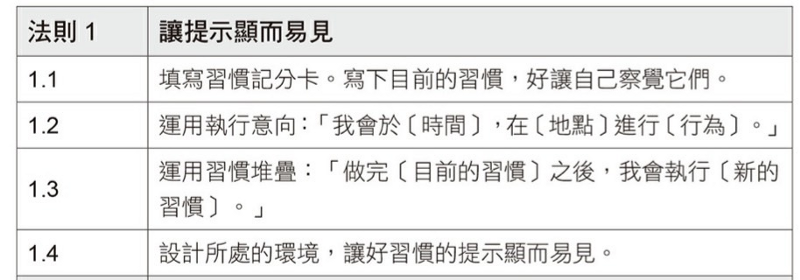
1. Fill out the Habit Scorecard
List all your current habits! Start scoring. Good habits are marked with a positive sign; bad habits are marked with a negative sign. Good or bad, go in circles. Start by looking at your habits before you know where to start.
2. Start Habit Building: Executing Intentions
I used to think about building a habit of exercising: I would say in my mind, I'm going to exercise three times this week!
As a result, a week often passed, and it was only a run. The reason is that there is no definite time and place that prompts our brains to execute exactly.
Change it to: I will run for an hour on the playground at 8pm. Then stick it in front of the desk, and it will be more targeted to execute the habit.
3. Habit stacking:
It is to bind a new habit before and after the good habit that has been cultivated!
The reward of having a habit upon completion will make implementing the new habit smoother.
Fourth, design the environment, so that good habits are constantly prompted!
I think that's the most important thing. Most of the time a habit needs to be implemented, often because the resistance to doing it is too great to use willpower for long. For example, if I am an office worker, if I am very tired after get off work, I have to ride a scooter from home for 20 minutes to exercise in the gym. Isn’t it very tiring every day? Then this habit is very hard to think about, and naturally you don't want to last.
Because the human brain tends to do the things with the least effort but the greatest effect. But if you go home every day and do 30 push-ups at home, it sounds much easier and more convenient! You can also take a hot shower right away.
(2) Make the habit attractive:

1. Temptation Binding Formula
After I do [The Habits I Need], I will implement the [Habits I Want].
For example: I have a habit of watching some youtube videos at night to relax, this is the habit I want. Then I bind the habit I want to cultivate before this: reading for thirty minutes. In this way, my reading habit will be driven by the rear rewards and easier to achieve.
2. To create better habits is to directly join the culture with the normal behavior of this group
American entrepreneurs once said that the average wealth of the five people closest to you is your wealth. Because the environment and people affect us the most. So if you want to be rich, try to meet successful and rich people and try to spend time with them and learn their secrets.
The same goes for habit formation, if you want to become a self-disciplined person, join a group of self-disciplined groups, attend their holiday book clubs, and follow them to exercise every week!
3. Create Motivation Ceremony
The brain is actually interesting, and as long as you can connect difficult habits to positive feelings, they become more attractive.
Assuming you want to increase your overall happiness level, look for one thing that makes you really happy—such as petting your dog or taking a bubble bath—and create a short ritual of doing it each time you love things are executed before. Maybe take three deep breaths and smile. Take three deep breaths, smile, and pet the dog. repeat.
Eventually, you'll start to associate this deep breathing and smiling ritual with a good mood, and it becomes a reminder to feel happy. Once set, you can use it every time you need to change your emotional state in the future. Stressful at work? Take three deep breaths, then smile. Is life making you sad? Take three deep breaths, then smile. Once a habit is established, cues can trigger cravings!
(3) Make action easy:
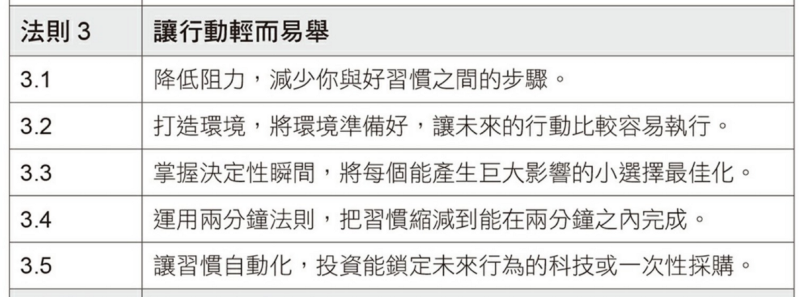
1. Reduce resistance and create an environment
I think developing a good habit definitely has a great relationship with the environment around you.
Human Nature: The Principle of Least Effort. The brain's setting is to spend the least energy and do the most efficient things.
For example, if you want to develop the habit of drinking 3000cc of water every day, you should put many large water bottles and water glasses near the table or near the body, so that drinking water is a simple matter of zero movement. If every time you drink water, you have to take a mug to the water dispenser for filling, and then you have to stand up and walk over to fill it after a few sips, and sometimes you may forget it when you are busy. This is the most important relationship between environment and resistance!
Reduce resistance associated with good habits. The less resistance there is, the easier it is to form a habit.
Increase resistance associated with bad habits. The more resistance there is, the harder it is to form a habit.
2. The two-minute rule, habit automation brings identity
Habit formation depends on frequency, not time! Focus on action, not initiation!
So in the early stages of habit building, never set too big daily goals. Start small, start by doing instead of planning all the time.
For example, exercise, set to exercise three times a week, one hour at a time, is actually quite a challenge, for people who are not used to it. In contrast, giving yourself 10 minutes of aerobics at home every day, or 10 push-ups, is relatively easier. The point is to do it every day!
Make simple things a habit. After automation, over time the brain will be persuaded to identify with me as someone who exercises every day! At this time, if you further strengthen the intensity of each exercise, it will actually be much easier!
(4) Make the reward satisfying:
The first three laws of behavior change—making the cue obvious, making the habit attractive, and making the action easy—increase our odds of performing a behavior this time around.
The fourth law of behavior change—making the reward satisfying— increases the likelihood that we will repeat the behavior next time.
Indispensable.
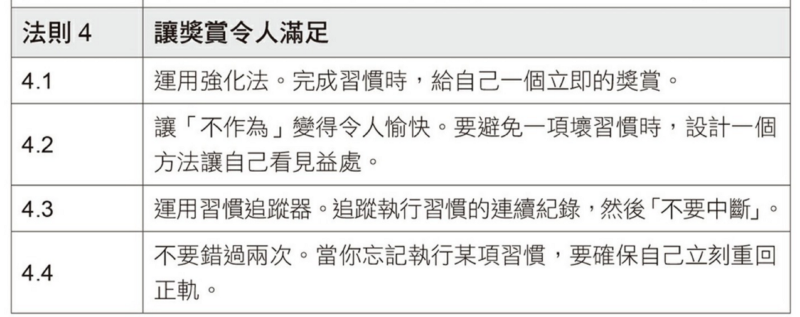
First, the use of reinforcement. Complete the habit and reward yourself immediately!
This is also human psychology! The human brain evolved to prioritize immediate reward over delayed reward.
So picking up the phone, swiping Facebook, and mourning, you can get immediate rewards; the brain will continue to get stimulated to produce dopamine.
But the rewards of reading and exercising are not immediate. It often takes several months before you find yourself speaking more gracefully, or your muscle lines becoming more pronounced.
But in fact, delayed reward is good for us in the long run, and temporary reward just distracts us more.
Therefore, in order to control the brain, you can still hold on, endure for the delayed reward, and you must allow yourself to have an immediate reward in time! This can strengthen your identity in a short time! After a long time, when you get used to this status, you don't necessarily need immediate reward feedback.
For example, if you want to lose weight: If you exercise more than 20 times a month, plan a small trip once a month to reward yourself for reaching your goal. Because the effect of exercise cannot be seen in a short period of time, additional incentives are needed to make us more motivated. And after exercising for a long time, in fact, when we find that our body becomes healthy and our posture improves, we will automatically reward ourselves, and there is no need for immediate reward after a long time!
2. Habit tracking + Habit contract partner!
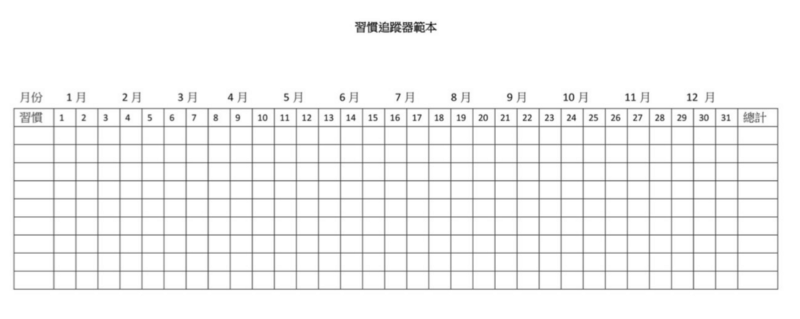
Habit Tracker (Card):
One, create visual cues that remind you to take action;
Second, it has a motivating effect in nature, because after seeing your progress, you will try to continue the record;
Three, bring satisfaction every time you jot down a successful example of executing a habit. Plus, habit tracking also provides visual evidence that you're voting for the kind of person you want to be, which in itself is a delightful and immediate inner gratification!
Habit Accountability Partners:
If you want to build a good habit, but often do not take action or have no motivation; then it is effective to find a habit partner to establish a contract, or to disclose your habit to those around you for inspection.
For example, build a habit of exercising with your lover. If you do not run more than 6 times in a month, you will be fined 500 yuan for one less time, which will be used as a fund for your next trip.
Or post on FB: If anyone steals sugary drinks this month and is seen by anyone, they will give him 500 yuan!
Get used to contracts and make breaking promises a public and painful affair!
3. Don't miss it twice!
I think this is a very important belief to form a habit! ! Because people still have inertia after all, sometimes they are in a bad mood and have no motivation to execute and so on. Obedience to the brain and human nature is actually very important. So sometimes suddenly one day you really want to be lazy or take a rest, let yourself take a break!
But remember, don't miss it! No two breaks in a row! Habit formation is a positive cycle. If you keep developing and rewarding, it will make the positive cycle better. But once stopped, this positive cycle subsides very quickly!
The above are the key notes of my reading atomic habit! I hope that while reminding myself to stick to good habits, it can also help everyone! I also highly recommend that you buy a copy and read and digest it yourself, you will definitely gain something!
- Be my appreciative citizen and help me go further by sponsoring a cup of coffee every month. https://liker.land/william53241/civic?utm_source=dashboard&utm_medium=app&utm_campaign=sponsor_link_cta
- Lemonway daily study notes FB fan: https://www.facebook.com/profile.php?id=100055469826072
- Lemonway daily study notes IG fan: https://www.instagram.com/learning_lemonway/
- If you want to cooperate, you can come to me here: william5324144@gmail.com
Like my work?
Don't forget to support or like, so I know you are with me..
Comment…